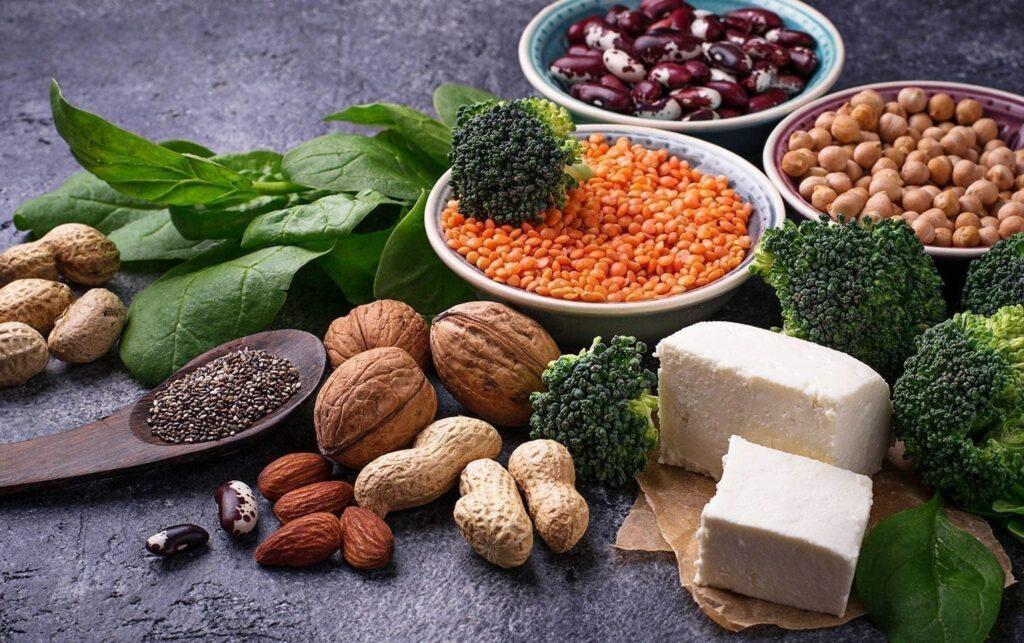The muscle protein synthetic response to the ingestion of 30 grams of a plant-derived protein blend “does not differ from the ingestion of an equivalent amount of a high quality animal-derived protein”, according to a new study.
The study, published in the Journal of Nutrition, is titled The Muscle Protein Synthetic Response to the Ingestion of a Plant-Derived Protein Blend Does Not Differ from an Equivalent Amount of Milk Protein in Healthy, Young Males.
“Plant-derived proteins are considered to have lesser anabolic properties when compared with animal-derived proteins”, begins the study. “The attenuated rise in muscle protein synthesis rates following ingestion of plant compared with animal-derived protein has been, at least partly, attributed to deficiencies in specific amino acids such as leucine, lysine, and/or methionine.” However, combining different plant-derived proteins “may provide plant-derived protein blends with a more balanced amino acid profile.”
This study “aimed to compare post-prandial muscle protein synthesis rates following the ingestion of 30 g milk protein with a 30 g blend combining wheat, corn, and pea protein in healthy, young males.”
In a randomized, double blind, parallel-group design, 24 young males received a primed continuous L-[ring-13C6]-phenylalanine infusion after which they ingested 30 g milk protein (MILK) or a 30 g plant-derived protein blend combining 15 g wheat, 7.5 g corn, and 7.5 g pea protein.
“Blood and muscle biopsies were collected frequently for 5 h to assess post-prandial plasma amino acid profiles (secondary outcome) and subsequent muscle protein synthesis rates (primary outcome). Data were analyzed by two way-repeated measures ANOVA and two-samples t-tests.”
According to the study, “MILK increased plasma essential amino acid concentrations more than PLANT-BLEND over the 5 h postprandial period (incremental area under curve 151±31 vs 79 ± 12 mmol∙300 min∙L-1 respectively; P < 0.001). Ingestion of both MILK and PLANT-BLEND increased myofibrillar protein synthesis rates (P < 0.001), with no significant differences between treatments (0.053 ± 0.013 and 0.064 ± 0.016%∙h-1, respectively; P = 0.08).”
The study concludes:
Ingestion of 30 g of a plant-derived protein blend combining wheat, corn, and pea-derived protein increases muscle protein synthesis rates in healthy, young males. The muscle protein synthetic response to the ingestion of 30 g of this plant-derived protein blend does not differ from the ingestion of an equivalent amount of a high quality animal-derived protein.
The full abstract of the study is below.
Abstract
Background: Plant-derived proteins are considered to have lesser anabolic properties when compared with animal-derived proteins. The attenuated rise in muscle protein synthesis rates following ingestion of plant compared with animal-derived protein has been, at least partly, attributed to deficiencies in specific amino acids such as leucine, lysine, and/or methionine. Combining different plant-derived proteins may provide plant-derived protein blends with a more balanced amino acid profile.
Objective: This study aimed to compare post-prandial muscle protein synthesis rates following the ingestion of 30 g milk protein with a 30 g blend combining wheat, corn, and pea protein in healthy, young males.
Design: In a randomized, double blind, parallel-group design, 24 young males (24 ± 4 y) received a primed continuous L-[ring-13C6]-phenylalanine infusion after which they ingested 30 g milk protein (MILK) or a 30 g plant-derived protein blend combining 15 g wheat, 7.5 g corn, and 7.5 g pea protein (PLANT-BLEND). Blood and muscle biopsies were collected frequently for 5 h to assess post-prandial plasma amino acid profiles (secondary outcome) and subsequent muscle protein synthesis rates (primary outcome). Data were analyzed by two way-repeated measures ANOVA and two-samples t-tests.
Results: MILK increased plasma essential amino acid concentrations more than PLANT-BLEND over the 5 h postprandial period (incremental area under curve 151±31 vs 79 ± 12 mmol∙300 min∙L-1 respectively; P < 0.001). Ingestion of both MILK and PLANT-BLEND increased myofibrillar protein synthesis rates (P < 0.001), with no significant differences between treatments (0.053 ± 0.013 and 0.064 ± 0.016%∙h-1, respectively; P = 0.08).
Conclusion: Ingestion of 30 g of a plant-derived protein blend combining wheat, corn, and pea-derived protein increases muscle protein synthesis rates in healthy, young males. The muscle protein synthetic response to the ingestion of 30 g of this plant-derived protein blend does not differ from the ingestion of an equivalent amount of a high quality animal-derived protein.


